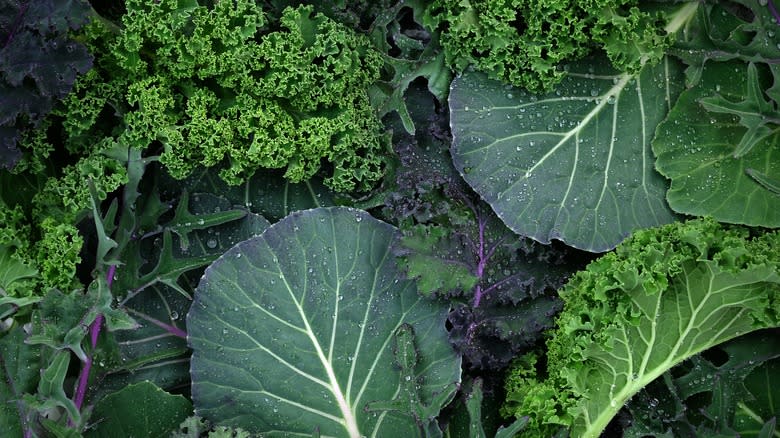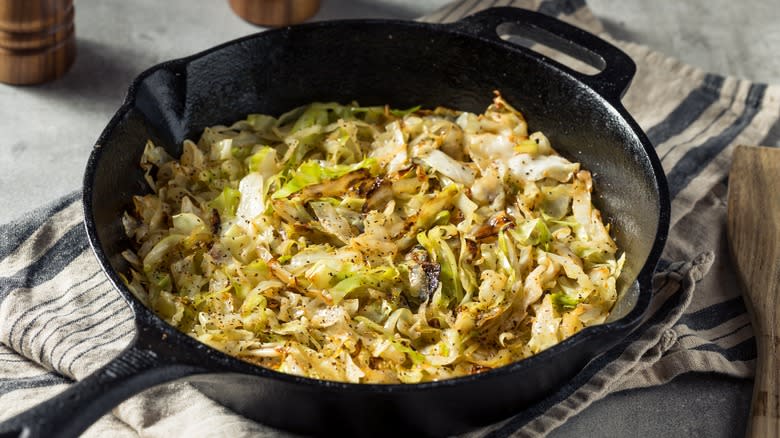If You Don't Like Kale, Cabbage Is An Equally Nutrient-Rich Alternative

Cabbage isn't usually the first thing to pop up in your head when you're thinking of nutritious greens to eat. Kale takes the top spot in this realm — or so you thought. Cabbage is actually a nutritionally dense vegetable containing many of the same nutrients as kale. Both leafy greens even belong to the same plant family known as brassica oleracea. Plus, if you don't like eating kale because of its bitter aftertaste and tough texture, cabbage has neither of those issues.
Both of these leafy greens of the brassica family have anti-cancer properties: Kale has phytonutrients while cabbage has isothiocyanates. A nutritional comparison of kale and cabbage shows that while kale may have more nutrients overall, cabbage certainly isn't lacking in this department. Cabbage has all the vitamins and minerals that kale does, including Vitamin C, iron, magnesium, and potassium, just in slightly lesser amounts. But cabbage makes up for it by containing four out of six B vitamins, which is more than kale. Cabbage also offers more dietary fiber intake than kale does.
Now you might be thinking that kale can be incorporated in a variety of dishes while cabbage only has a few options. That's not true at all. Cabbage has a special place in many dishes that would be incomplete without the leafy vegetable.
Read more: 12 Vegetables And Fruits That Used To Look Very Different
Dishes You Can Make With Cabbage

Cabbage comes in many varieties, giving you more options to cook with, and you can look to Asian cuisines for inspiration. From cabbage rolls to wonton soup to kimchi, the options are endless and delicious.
A hearty filling of savory beef and rice makes a great stuffed cabbage recipe and a satisfying dish. The key to cabbage rolls is to freeze the cabbage so that the leaves are more pliable. Cabbage leaves are also a nutritious alternative to use in all kinds of wraps, where you can swap it in for lettuce or kale. Kimchi is another way to make use of cabbage. Whether you're making traditional kimchi or an easy kimchi slaw, both can be added to almost any dish or sandwich to spice it up. Kimchi is also a good way to up your intake of gut-healthy probiotics. Bok choy is a type of cabbage that is especially popular in Asian foods. It can be stir-fried and served as a side dish or added to soups, such as homemade wonton soup.
Outside of Asian cuisines, cabbage is a great alternative to kale to make chips. Both the classic green and purple cabbages can be used to make cabbage chips. Whether you're a fan of kale chips and are looking for another leafy green alternative, or you never liked kale chips, cabbage is the way to go. Like kale chips, you can opt for a classic salty cabbage chip or something more seasoned with spices and herbs.
How To Avoid Overcooking Cabbage

It's always a good idea to avoid overcooking anything because overcooking can cause a loss of nutrients. Plus, with cabbage, overcooking it can cause it to turn out bland and mushy. This can be avoided by using the salt trick to prevent soggy cabbage. Cabbage is made up of about 92% water, meaning when it's cooked, it will quickly release its water content and go from being crisp to limp. To avoid this, salt your cabbage before cooking and then drain the water that is released from the cabbage. This will leave you with crisp cabbage that won't get soggy the minute you put it in a saucepan.
Even with the salt trick, cabbage will still soften when cooked. That's just in its nature. One thing to keep in mind is that the best-cooked cabbage still has an al dente bite to it, giving it a sweet taste rather than the bitterness of overcooked cabbage. Another reason to avoid overcooking cabbage is because of its resulting rotten egg-like smell. Both of these things occur due to the sulfur compounds in cabbage that are activated during the cooking process, stinking up the kitchen.
Cooked or raw, cabbage is extremely versatile and you can simply swap it wherever a recipe calls for kale. Keeping in mind these tips to get that perfectly cooked bite will have you enjoying cabbage and its nutrients in no time.
Read the original article on Daily Meal.

